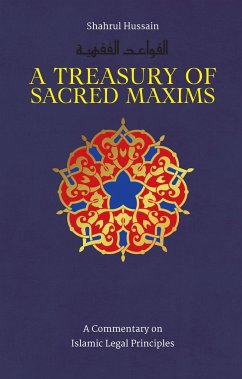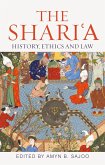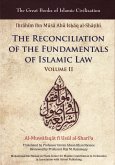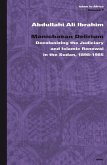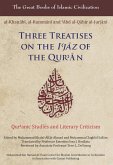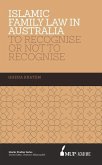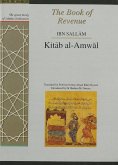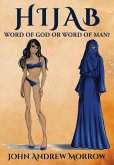13,99 €
inkl. MwSt.
Versandfertig in über 4 Wochen

7 °P sammeln
- Gebundenes Buch
- Merkliste
- Auf die Merkliste
- Bewerten Bewerten
- Teilen
- Produkt teilen
- Produkterinnerung
- Produkterinnerung
An introduction to a wide range of pivotal Islamic maxims with accompanying commentaries. Presented in a beautiful gift format.
Andere Kunden interessierten sich auch für
![The Shari'a The Shari'a]() The Shari'a56,99 €
The Shari'a56,99 €![Reconciliation of the Fundamentals of Islamic Law Reconciliation of the Fundamentals of Islamic Law]() Ibrahim Ibn Al-ShatibiReconciliation of the Fundamentals of Islamic Law64,99 €
Ibrahim Ibn Al-ShatibiReconciliation of the Fundamentals of Islamic Law64,99 €![Manichaean Delirium Manichaean Delirium]() Abdullah Ali IbrahimManichaean Delirium219,99 €
Abdullah Ali IbrahimManichaean Delirium219,99 €![Three Treatises on the I'jaz of the Qur'an Three Treatises on the I'jaz of the Qur'an]() Issa J BoullataThree Treatises on the I'jaz of the Qur'an64,99 €
Issa J BoullataThree Treatises on the I'jaz of the Qur'an64,99 €![ISS 16 Islamic Family Law in Australia ISS 16 Islamic Family Law in Australia]() Ghena KrayemISS 16 Islamic Family Law in Australia65,99 €
Ghena KrayemISS 16 Islamic Family Law in Australia65,99 €![The Book of Revenue The Book of Revenue]() Abu Ubayd SallamThe Book of Revenue81,99 €
Abu Ubayd SallamThe Book of Revenue81,99 €![Hijab Hijab]() John Andrew MorrowHijab118,99 €
John Andrew MorrowHijab118,99 €-
-
-
An introduction to a wide range of pivotal Islamic maxims with accompanying commentaries. Presented in a beautiful gift format.
Hinweis: Dieser Artikel kann nur an eine deutsche Lieferadresse ausgeliefert werden.
Hinweis: Dieser Artikel kann nur an eine deutsche Lieferadresse ausgeliefert werden.
Produktdetails
- Produktdetails
- Verlag: Kube Publishing Ltd
- Seitenzahl: 160
- Erscheinungstermin: 18. April 2017
- Englisch
- Abmessung: 185mm x 122mm x 15mm
- Gewicht: 223g
- ISBN-13: 9781847740960
- ISBN-10: 1847740960
- Artikelnr.: 44801746
- Herstellerkennzeichnung
- Libri GmbH
- Europaallee 1
- 36244 Bad Hersfeld
- 06621 890
- Verlag: Kube Publishing Ltd
- Seitenzahl: 160
- Erscheinungstermin: 18. April 2017
- Englisch
- Abmessung: 185mm x 122mm x 15mm
- Gewicht: 223g
- ISBN-13: 9781847740960
- ISBN-10: 1847740960
- Artikelnr.: 44801746
- Herstellerkennzeichnung
- Libri GmbH
- Europaallee 1
- 36244 Bad Hersfeld
- 06621 890
Shahrul Hussain: Dr. Shahrul Hussain is Lecturer in Islamic Studies at Markfield Institute of Higher Education, UK. He studied classical Islamic studies and Arabic at a specialist Islamic seminary, Darul Uloom Al-Islamiyah Al-Arabiyah College, Birmingham. After graduating from Darul Uloom he won a scholarship to study at the pre-eminent University of Al-Azhar, Cairo, Egypt, and graduated from the Faculty of Islamic Jurisprudence and Law in 2001. In 2010 he completed his PhD at the University of Aberdeen, Scotland.
INTRODUCTION
PART ONE
1: al-Umuru bi-maqasidi-ha : Acts are judged by their goals and purposes
2: There is no reward without intention
3: Combining two acts of worship with one intention
4: In contracts regard is paid to objectives and meanings
5: Regard is paid to will and not to words
6: No regard is paid to implication when explication is found
7: Giving preference to others over oneself in acts of worship is disliked
but laudable in all other circumstances
8: Regard is paid to intentions and beliefs in transactions and expressions
as it is in acts of worship
PART TWO
9: al-Darar yuzaal : Harm must be eliminated
10: Specific harm is endured in order to supress general harm
11: Warding off harm has priority over bringing about benefits
12: Dire exigency renders lawful the unlawful
13: Whatever is rendered lawful due to dire exigency must be proportionate
to the need
14: When two evils unite take the lesser of the two
15: Harm is not replaced by another harm
16: Need becomes the same as dire exigency
17: There is no harm or reciprocating harm
18: That which is unlawful to take is unlawful to give
19: That which is unlawful to do is unlawful to request
PART THREE
20: Al-'Adah muhakkama: Customary usage is the determining factor
21: People's customary practise is legal proof and must be regarded
22: What is rejected by custom is rejected in reality
23: Literality is abandoned in favour of custom
24: Custom is established when it becomes constant or dominant practise
25: Regard is paid to the dominant and widespread and not to the unwonted
26: That which is known in custom is like a stipulated precondition
27: That which is customarily loathsome is loathsome is acts of worship
28: Rulings change due to the change is times
30: If the prohibition conflicts with the necessary the prohibition is
given preference
PART FOUR
31: Al-Yakin la yazulu bil-shakk: Certainty is not overrule by doubt
32: The original rule is freedom from responsibility
33: The original rule is lawfulness
34: The original rule is the literal meaning
35: The original rule is continuity of the past ruling
36: when the lawful and unlawful mixed, the unlawful dominates
37: Al-Mushaqqa tajlib al-taysir: Hardship begets facility
38: When matters become too constricted it is broadened and when it is too
broadened it is constricted
39: Property is transferred by guarantee
40: Actions are attributed to the doer and not to the instigator
41: If the doer and the causer are blamed the action is attributed to the
doer
FURTHER READING
PART ONE
1: al-Umuru bi-maqasidi-ha : Acts are judged by their goals and purposes
2: There is no reward without intention
3: Combining two acts of worship with one intention
4: In contracts regard is paid to objectives and meanings
5: Regard is paid to will and not to words
6: No regard is paid to implication when explication is found
7: Giving preference to others over oneself in acts of worship is disliked
but laudable in all other circumstances
8: Regard is paid to intentions and beliefs in transactions and expressions
as it is in acts of worship
PART TWO
9: al-Darar yuzaal : Harm must be eliminated
10: Specific harm is endured in order to supress general harm
11: Warding off harm has priority over bringing about benefits
12: Dire exigency renders lawful the unlawful
13: Whatever is rendered lawful due to dire exigency must be proportionate
to the need
14: When two evils unite take the lesser of the two
15: Harm is not replaced by another harm
16: Need becomes the same as dire exigency
17: There is no harm or reciprocating harm
18: That which is unlawful to take is unlawful to give
19: That which is unlawful to do is unlawful to request
PART THREE
20: Al-'Adah muhakkama: Customary usage is the determining factor
21: People's customary practise is legal proof and must be regarded
22: What is rejected by custom is rejected in reality
23: Literality is abandoned in favour of custom
24: Custom is established when it becomes constant or dominant practise
25: Regard is paid to the dominant and widespread and not to the unwonted
26: That which is known in custom is like a stipulated precondition
27: That which is customarily loathsome is loathsome is acts of worship
28: Rulings change due to the change is times
30: If the prohibition conflicts with the necessary the prohibition is
given preference
PART FOUR
31: Al-Yakin la yazulu bil-shakk: Certainty is not overrule by doubt
32: The original rule is freedom from responsibility
33: The original rule is lawfulness
34: The original rule is the literal meaning
35: The original rule is continuity of the past ruling
36: when the lawful and unlawful mixed, the unlawful dominates
37: Al-Mushaqqa tajlib al-taysir: Hardship begets facility
38: When matters become too constricted it is broadened and when it is too
broadened it is constricted
39: Property is transferred by guarantee
40: Actions are attributed to the doer and not to the instigator
41: If the doer and the causer are blamed the action is attributed to the
doer
FURTHER READING
INTRODUCTION
PART ONE
1: al-Umuru bi-maqasidi-ha : Acts are judged by their goals and purposes
2: There is no reward without intention
3: Combining two acts of worship with one intention
4: In contracts regard is paid to objectives and meanings
5: Regard is paid to will and not to words
6: No regard is paid to implication when explication is found
7: Giving preference to others over oneself in acts of worship is disliked
but laudable in all other circumstances
8: Regard is paid to intentions and beliefs in transactions and expressions
as it is in acts of worship
PART TWO
9: al-Darar yuzaal : Harm must be eliminated
10: Specific harm is endured in order to supress general harm
11: Warding off harm has priority over bringing about benefits
12: Dire exigency renders lawful the unlawful
13: Whatever is rendered lawful due to dire exigency must be proportionate
to the need
14: When two evils unite take the lesser of the two
15: Harm is not replaced by another harm
16: Need becomes the same as dire exigency
17: There is no harm or reciprocating harm
18: That which is unlawful to take is unlawful to give
19: That which is unlawful to do is unlawful to request
PART THREE
20: Al-'Adah muhakkama: Customary usage is the determining factor
21: People's customary practise is legal proof and must be regarded
22: What is rejected by custom is rejected in reality
23: Literality is abandoned in favour of custom
24: Custom is established when it becomes constant or dominant practise
25: Regard is paid to the dominant and widespread and not to the unwonted
26: That which is known in custom is like a stipulated precondition
27: That which is customarily loathsome is loathsome is acts of worship
28: Rulings change due to the change is times
30: If the prohibition conflicts with the necessary the prohibition is
given preference
PART FOUR
31: Al-Yakin la yazulu bil-shakk: Certainty is not overrule by doubt
32: The original rule is freedom from responsibility
33: The original rule is lawfulness
34: The original rule is the literal meaning
35: The original rule is continuity of the past ruling
36: when the lawful and unlawful mixed, the unlawful dominates
37: Al-Mushaqqa tajlib al-taysir: Hardship begets facility
38: When matters become too constricted it is broadened and when it is too
broadened it is constricted
39: Property is transferred by guarantee
40: Actions are attributed to the doer and not to the instigator
41: If the doer and the causer are blamed the action is attributed to the
doer
FURTHER READING
PART ONE
1: al-Umuru bi-maqasidi-ha : Acts are judged by their goals and purposes
2: There is no reward without intention
3: Combining two acts of worship with one intention
4: In contracts regard is paid to objectives and meanings
5: Regard is paid to will and not to words
6: No regard is paid to implication when explication is found
7: Giving preference to others over oneself in acts of worship is disliked
but laudable in all other circumstances
8: Regard is paid to intentions and beliefs in transactions and expressions
as it is in acts of worship
PART TWO
9: al-Darar yuzaal : Harm must be eliminated
10: Specific harm is endured in order to supress general harm
11: Warding off harm has priority over bringing about benefits
12: Dire exigency renders lawful the unlawful
13: Whatever is rendered lawful due to dire exigency must be proportionate
to the need
14: When two evils unite take the lesser of the two
15: Harm is not replaced by another harm
16: Need becomes the same as dire exigency
17: There is no harm or reciprocating harm
18: That which is unlawful to take is unlawful to give
19: That which is unlawful to do is unlawful to request
PART THREE
20: Al-'Adah muhakkama: Customary usage is the determining factor
21: People's customary practise is legal proof and must be regarded
22: What is rejected by custom is rejected in reality
23: Literality is abandoned in favour of custom
24: Custom is established when it becomes constant or dominant practise
25: Regard is paid to the dominant and widespread and not to the unwonted
26: That which is known in custom is like a stipulated precondition
27: That which is customarily loathsome is loathsome is acts of worship
28: Rulings change due to the change is times
30: If the prohibition conflicts with the necessary the prohibition is
given preference
PART FOUR
31: Al-Yakin la yazulu bil-shakk: Certainty is not overrule by doubt
32: The original rule is freedom from responsibility
33: The original rule is lawfulness
34: The original rule is the literal meaning
35: The original rule is continuity of the past ruling
36: when the lawful and unlawful mixed, the unlawful dominates
37: Al-Mushaqqa tajlib al-taysir: Hardship begets facility
38: When matters become too constricted it is broadened and when it is too
broadened it is constricted
39: Property is transferred by guarantee
40: Actions are attributed to the doer and not to the instigator
41: If the doer and the causer are blamed the action is attributed to the
doer
FURTHER READING
